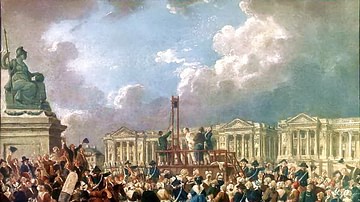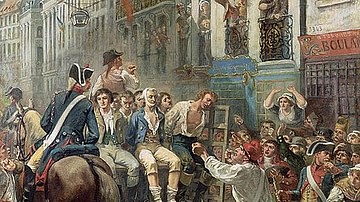"I come to ask, not the gods, but legislators…to erase from the code of the French the blood laws that command judicial murders" (Robespierre, 6). These impassioned words, spoken by Maximilien Robespierre before France's National Constituent Assembly on 22 June 1791, urged the abolition of the death penalty, which Robespierre referred to as barbaric, pointless, and an antithesis to justice.
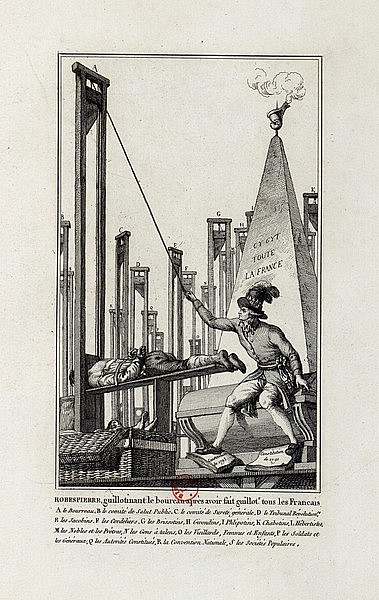
Less than three years later, that same Robespierre presided over the Reign of Terror, a bloody phase of the French Revolution (1789-1799) in which thousands of citizens were executed by guillotine. Such an abrupt reversal of opinions in such a short (albeit chaotic) period of time is certainly interesting, especially when the subject is one as puritanically self-righteous as Robespierre. After all, this was a man who had earned the nickname 'the Incorruptible' because he never compromised his beliefs, a man who believed so firmly in the Revolution's core principles that he could not fathom that the Revolution – and by extension himself – could ever possibly be wrong. Why, then, did Robespierre seemingly change his mind on the topic of capital punishment? Was it the Incorruptible who changed or the Revolution itself?
Three of his speeches in particular are good places to start trying to deduce his motivations, each one given at a different point in the Revolution and in his life: the first is the aforementioned speech of June 1791, when he urged the abolition of the death penalty. The second is the one he gave before the trial and execution of Louis XVI, explaining his vote for the former king's execution. The third is his famous "Virtue and Terror" speech, in which he explains the necessity of Terror for the survival of a virtuous Republic. Of course, Robespierre's true internal motivations can never be known – he was a meticulously private man whose life is often looked at through a heavily biased lens, either for him or against him. Yet through his own words, one can at least attempt to glimpse inside the mind of the Incorruptible, to try and see how such an apparently moralistic man could be the cause of so much death.
On the Death Penalty – 22 June 1791
Since his time as a smalltown lawyer in Arras, Robespierre was averse to the death penalty. According to his sister Charlotte (who, admittedly, was a biased source writing decades after his death), Robespierre was once required to sentence a murderer to death in the course of his routine work for the Arras court. He did his duty and attached his signature to the death warrant, but afterwards lapsed into a period of despondence. He did not eat for two days and paced about the house he shared with his sister, muttering, "I know he is guilty, that he is a villain, but even so, to cause a man to die!" (Scurr, 44). Whether or not Charlotte's account is embellished, the story is consistent with Robespierre's beliefs and his career in Arras; he usually refused to take on a case unless the defendant was a victim of obvious injustice. In this case, he would have sympathized with the condemned man who was executed by hanging rather than the comparatively swift and painless death by beheading reserved for the better-off.
Robespierre took this belief with him to the Estates-General of 1789 and then on to the National Constituent Assembly, before whom he delivered his anti-death penalty speech in June 1791. At that stage in the Revolution, he was little more than a rising star in the Jacobin Club, who struggled to stand out amidst a sea of booming orators and Enlightened visionaries. Although King Louis XVI of France (r. 1774-1792) had recently made his ill-fated flight to Varennes, an occasion that would soon obliterate France's remaining trust in its monarchy, June 1791 was still a calm moment in the Revolution. While tensions certainly existed between various political factions and the monarchies of Europe, the French Revolutionary Wars (1792-1802) were still in the future and not yet a foregone conclusion; there was still hope at maintaining a constitutional monarchy with a citizen-king as its figurehead; the constitution of 1791 was nearing its completion, leaving the nation hopeful for a new, egalitarian society.
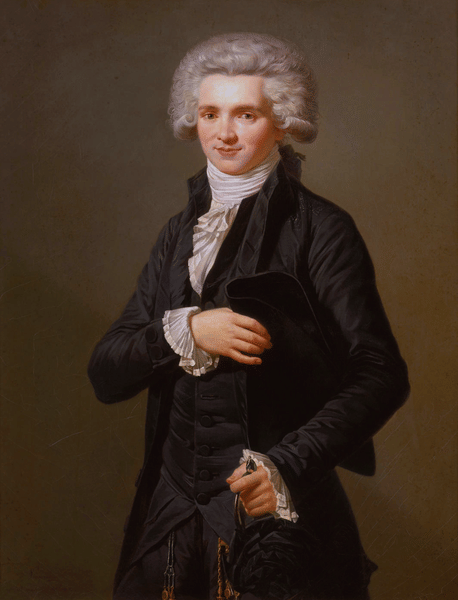
This was the backdrop against which Robespierre made his speech. He begins by regaling his fellow deputies with a story about those condemned to death in the ancient Greek city of Argos:
The news having been brought to Athens that citizens had been condemned to death in the city of Argos, people ran to the temples, where the gods were called upon to turn Athenians away from such cruel and dire thoughts. I come to ask, not the gods, but legislators-who should be the organs and the interpreters of the eternal laws that the divinity dictated to men- to erase from the code of the French the blood laws that command judicial murders, and that their morals and their new constitution reject. I want to prove to them: 1 – that the death penalty is essentially unjust, and 2 – that it isn't the most repressive of penalties and that it multiplies crimes more than it prevents them. (Robespierre, 6)
Robespierre goes on to argue that killing another man is justified by natural law only if it is done out of self-defense; to kill a man who has already been disarmed and imprisoned is a "cowardly assassination", no better than a barbarian butchering his captives or a teacher who murders a perverse child rather than punishing him. The death penalty, he argues, has long been the tool tyrants have used to subjugate the human race, one that also fails at deterring criminal acts; for the civic-minded Robespierre, people are much more scared of public scorn and ostracization than they are of the prospect of dying. Human integrity, not the will to live, is the dominant human passion, meaning that lawmakers have mistakenly equated the severity of punishment with its effectiveness. Furthermore, Robespierre is concerned that the death penalty would dissuade good citizens from turning in criminals, for fear of depriving them of life. He concludes that the death penalty is nothing more than the state punishing a crime with another crime; to deprive a man of his life removes the possibility of his redemption through acts of virtue.
Ultimately, Robespierre failed to convince his colleagues to abolish the death penalty. Yet his speech provides a window into the Incorruptible's mind, giving hints of what was to come. For instance, he allows that killing is acceptable only in moments of self-defense, though he fails to elaborate on when a state can rightfully kill to preserve itself. It is also made clear that Robespierre believes all "good citizens" value their participation and positions in society over life itself; such thinking lends itself to the Enlightenment idea of vertu, or "virtue", which is defined as striving for a public as well as a private good. Robespierre believed vertu was the single most important quality of a healthy republic, and that those who thought selfishly would inevitably corrupt the body politic. Such a concept would be important in his future decisions.
The King Must Die – 3 December 1792
Only a year and a half after Robespierre had called for the end of capital punishment, the Revolution had become rapidly unstable. Although the armies of Austria and Prussia had been temporarily hindered in their attack, Europe's coalition against France still threatened to expand and engulf the Revolution. Paranoid French citizens became fearful of suspected counter-revolutionary conspirators, leading to acts of politically motivated mass slaughter like the September Massacres of 1792. Finally, the monarchy had been overthrown, and a French Republic was declared. Now referred to as Citizen Louis Capet, the former king was about to be tried for high treason against France and its people.
By now, Robespierre had become one of the most respected and influential figures in the radical leftist Jacobin Club. Acknowledging the shifting needs of the Revolution, Robespierre did not extend his lenient beliefs of 1791 to the king's situation. Not only did he call for the former king's immediate execution, but he believed that Louis should be denied the right to a trial. He explained his reasoning on 3 December 1792 in a speech before the new National Convention, which was set to try the king:
Louis was king and the republic is founded. The great question with which you are occupied is settled by this argument: Louis has been deposed by his crimes. Louis denounced the French people as rebels; to punish them he called upon the arms of his fellow tyrants. Victory and the people have decided that he alone was a rebel. Therefore, Louis cannot be judged; he has already been condemned, else the republic is not cleared of guilt. To propose a trial for Louis XVI of any sort is to step backward toward royal and constitutional despotism. Such a proposal is counter-revolutionary since it would bring the Revolution itself before the court. In fact, if Louis could yet be tried, he might be found innocent…if Louis is acquitted, where then is the Revolution? (Scurr, 244)
Here, Robespierre makes the argument that the king must die so the Republic could live. At surface level, this belief appears at odds with his stance against the death penalty. Yet Robespierre makes the distinction that while the death penalty is never justified against ordinary citizens, the king is in a unique position of being a figure whose very existence poses a threat to the Republic. While Louis lived, foreign powers and domestic conspirators could still rally behind his claim to the throne. If he were imprisoned or even exiled, Louis would remain dangerous to the Republic's survival. Additionally, Louis was not being judged by an ordinary court but by the people itself; and, in Robespierre's words, "a people does not judge as does a court of law. It does not hand down sentences, it hurls down thunderbolts; it does not condemn kings, it plunges them into the abyss" (Scurr, 245).
There was also the matter of the all-important vertu to consider. Robespierre's close ally, Louis Antoine Saint-Just, made the argument that the king had corrupted vertu and that the true Revolution could not begin until he was unable to commit any more abuses. Therefore, Robespierre and his allies were able to shift their attitudes toward capital punishment without altering their core principles; in June 1791, Robespierre had argued that killing was morally justifiable if it was done in self-defense. Now, he argued that by killing the king, France was both preserving its republic and maintaining its vertu. This would be the foundation for his later justification of the Terror.
Virtue and Terror – 5 February 1794
Following the execution of the king, the French Republic slipped further into turmoil. France's list of wartime enemies grew ever larger as large swathes of the country rebelled against the revolutionary government in Paris. On 27 July 1793, Robespierre was elected to the Committee of Public Safety, a twelve-man assembly, which would soon rule over France with near-dictatorial powers. On 5 September, Terror was declared to be "the order of the day", and the subsequent Law of Suspects allowed for the arrests of hundreds of thousands of people nationwide. The law's wording was vague enough so that it could potentially be applied to just about anyone, and many were arrested on the flimsiest charges relating to counter-revolutionary conspiracy. Around 16,000 people were guillotined nationwide during the Terror, including many political enemies of Robespierre and the Jacobins.
Yet the "Incorruptible" Robespierre justified Terror as a necessary evil, the only way to ensure a virtuous body politic. He again justified himself in a speech to the National Convention on 5 February 1794, given as he neared the peak of his political power. In this speech, he asserts that the end goal of the Revolution is to create "a reign of that eternal justice whose laws have been inscribed…on the hearts of all men", a society built entirely on morality, integrity, and vertu (Robespierre, 19). Such a society is the most natural state of humanity and is needed to fulfill its destiny. Opposing this society is one based on weakness, vice, and prejudice, traits that lead to the "road of royalty". Since a republic represents the will of the people, there must be something to guarantee that will remains "virtuous" and unselfish, lest a few bad actors corrupt the whole thing. To ensure a persevering vertu, Terror, therefore, is necessary:
If the mainspring of popular government in peacetime is virtue, amid revolution it is at the same time both virtue and terror: virtue, without which terror is fatal; terror, without which virtue is impotent. Terror is nothing but prompt, severe, inflexible justice; it is therefore an emanation of virtue. It is less a special principle than a consequence of the general principle of democracy applied to our country's most pressing needs. (Robespierre, 21)
Like his rationale for the king's death, Robespierre believed that the deaths of conspirators, aristocrats, and other agents of counter-revolution were essential for the Republic's self-defense, in both a literal and spiritual sense. He words his reasoning so that he does not contradict his initial statements of 1791. In the case of the Terror, capital punishment is justified as a form of self-preservation; its effectiveness as a deterrent is irrelevant, since Robespierre meant to root out existing enemies, not necessarily to deter criminal acts. Robespierre, who believed he fought against injustice in 1791, still believed he fought against it in 1794. It was only the tools of justice that had changed. Self-righteous as ever, Robespierre kept espousing this justification as the Law of 22 Prairial (10 June 1794) intensified the Terror. The bloodshed did not end until Robespierre himself was executed on 28 July 1794, having never deviated from his quest for a virtuous France.
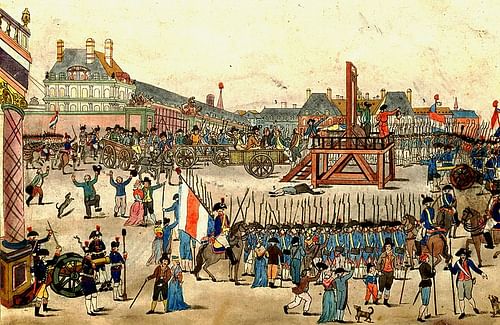
Conclusion
At first, it may seem difficult to understand how a smalltown lawyer sickened by the prospect of executing a murderer could go on to preside over thousands of executions. The answer lies in Mirabeau's observation, "That man will go far – he believes everything he says." Indeed, Robespierre did go far because he believed everything he said, but it can also be said that he became so ruthless for the same reason. Although his attitude toward capital punishment itself changed, it shifted alongside the very revolution he tried to personify; he called for leniency when the Revolution was calm and needed leniency, and preached Terror when the Revolution was in danger and needed to defeat its enemies. It was not so much the death penalty itself he was against, but injustice; the murderer he reluctantly sentenced to death in Arras was hanged while better-off criminals were beheaded. Under Robespierre's Terror, the guillotine claimed everyone, no matter their status. He believed that under ordinary circumstances the death penalty could never be justified, but during times of crisis, it was not only necessary but the embodiment of justice itself.
Of course, from an outside perspective, Robespierre's reasoning may seem flawed, merely an excuse to maintain his own image and excuse the bloodletting of the Terror. Yet in understanding the French Revolution it is necessary to try to understand the mind of the Incorruptible as he may have seen himself – as a man whose quest for vertu became paramount to all else, who would not compromise his principles even to save the life of Camille Desmoulins, his schoolyard friend. While Robespierre may have started out with good intentions, clearly he allowed himself to stray down a dark and bloody path, incapable, or perhaps unwilling, to see the comparisons between himself and the tyrants he had long struggled against.





